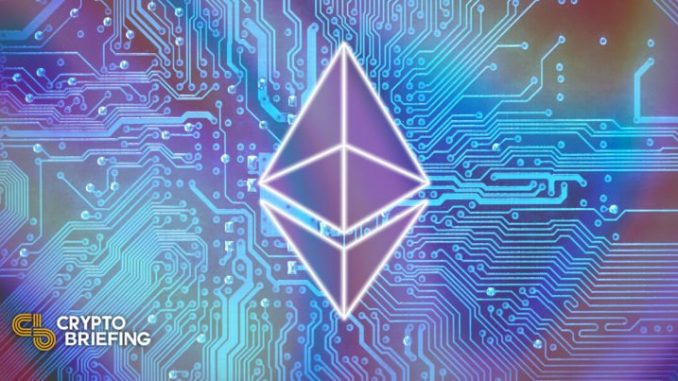
Key Takeaways
ssv.network has raised $10 million from Digital Currency Group, Coinbase, and other investors.
ssv.network is a decentralized staking protocol for running nodes on Ethereum’s consensus layer.
Ethereum is expected to complete its merge to Proof-of-Stake this year.
Share this article
ssv.network, a decentralized staking protocol for Ethereum’s consensus layer, has raised $10 million to expand its platform.
ssv.network Aims to Simplify Ethereum Staking
ssv.network has raised $10 million to improve its offering.
In a press release, the project’s team said that venture capital funds and partner firms collectively contributed $10 million to its treasury, which is overseen by ssv.network’s decentralized autonomous organization. The contributors include Digital Currency Group, Coinbase, Lukka, and OKX, among others.
ssv.network core contributor Eran Efrima told Crypto Briefing that the $10 million would be used “to fund initiatives, collaborations, and future grants for developers and participants.”
ssv.network aims to simplify the process of staking and running validator nodes on Ethereum’s consensus layer, which was previously known as ETH 2.0. The project launched after receiving a grant from the Ethereum Foundation last year. It’s currently in a testnet phase.
Ethereum plans to switch from Proof-of-Work consensus to a Proof-of-Stake mechanism in an event that’s been dubbed “the merge.” It’s expected to complete the update sometime in 2022. After that point, miners will no longer validate transactions. Instead, users who stake a minimum of 32 ETH to run a validator node will validate transactions and earn rewards for their service.
However, staking and setting a validator node can be technically complex for many users. The 32 ETH deposit requirement is also a high barrier to entry given ETH’s market price. In response, several staking services for Ethereum’s Beacon Chain have emerged, but many of them face problems related to the storage and control of validator keys.
Some of today’s most popular Ethereum staking services require ETH holders to give up control of their assets, which means that they compromise on decentralization. While non-custodial validator node solutions are also available, they are often difficult for newer users to understand and must often have regular upgrades.
ssv.network says it has addressed the common issues associated with staking infrastructure by offering a decentralized service that can also maintain high performance. The network leverages research developed in-house on the Secret Shared Validators protocol, which shares operation and key management for Ethereum validators. The team says that users can stake their ETH in SSV validator nodes without compromising either security or worrying about the node’s performance.
ssv.network uses a network of “operators” who maintain trustless management of Ethereum validator nodes. Many crypto firms that provide staking services have joined ssv.network as operators. For participating in the network, they can earn rewards in the form of SSV, the protocol’s governance and staking token.
Disclosure: At the time of writing, the author of this piece owned ETH and several other cryptocurrencies.
Share this article
The information on or accessed through this website is obtained from independent sources we believe to be accurate and reliable, but Decentral Media, Inc. makes no representation or warranty as to the timeliness, completeness, or accuracy of any information on or accessed through this website. Decentral Media, Inc. is not an investment advisor. We do not give personalized investment advice or other financial advice. The information on this website is subject to change without notice. Some or all of the information on this website may become outdated, or it may be or become incomplete or inaccurate. We may, but are not obligated to, update any outdated, incomplete, or inaccurate information.
You should never make an investment decision on an ICO, IEO, or other investment based on the information on this website, and you should never interpret or otherwise rely on any of the information on this website as investment advice. We strongly recommend that you consult a licensed investment advisor or other qualified financial professional if you are seeking investment advice on an ICO, IEO, or other investment. We do not accept compensation in any form for analyzing or reporting on any ICO, IEO, cryptocurrency, currency, tokenized sales, securities, or commodities.
See full terms and conditions.
Vitalik Buterin: Ethereum Will Likely Never Be Much Faster
In a comment that may rattle some Ethereum enthusiasts, Vitalik Buterin has expressed the view that Ethereum may never be much faster than it is now. He explained that reducing…
EIP-1559 and the Future of Ethereum with Justin Drake
Justin Drake talks ahead of Ethereum’s EIP-1559 update, shipping as part of the London hardfork. A Landmark Year for Ethereum Ethereum is going through big changes. The price of ETH…
Is Time on our Side? The Case for Bitcoin’s Lengthening Cycles
One of the many unique features of BTC is its halving process, which is often accompanied by a bullish movement and preceded by bearish consolidation. Bitcoin’s halving events have been…
Bitcoin to $1M, Ethereum to $180,000 by 2030: ARK Report
In a new research report, American investment firm ARK Invest has shared bold price predictions for Bitcoin and Ethereum for the end of this decade. ARK Makes Bull Case for…





Be the first to comment